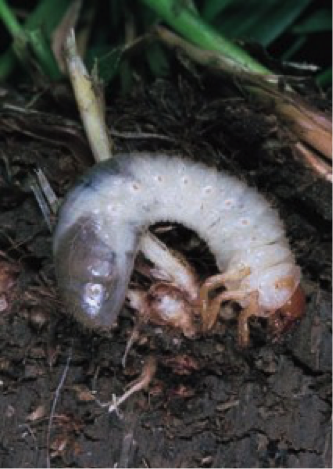Forgive me for the corny title, but we get a lot of questions about lime this time of year. When we say [Read More...]
Grub FAQ:
 Why should I worry about grubs?
Why should I worry about grubs?
There are several types of white grubs that feed on the roots of lawn grass. All of them can cause severe damage if left untreated.
Grubs live and feed in the soil. It’s easy to miss them, as they cut the roots out from under your lawn, until brown patches begin to appear and the grubs are finally discovered. Grubs are also a popular food source for rodents like moles, skunks, and armadillos.
How can I tell if I have grubs?
Pull back the turf if you suspect grubs. If the lawn pulls up easily (like new sod) you may find C-shaped white grubs in the top inch or so of your soil.
What are grubs?
Grubs are the larval (or worm) state of many types of beetles. The beetles lay their eggs in your lawn, and the newly hatched worms work their way through the thatch and into the soil. Most beetles lay their eggs mid to late summer, and the young grubs do their greatest damage during the fall months.
As the weather cools, most grubs burrow into the soil for the winter, and return to the surface to feed again as the soil warms in the spring. After this spring feeding, the grubs pupate into adult beetles and begin the cycle again.
Won’t grubs just die in the winter?
Grubs don’t disappear on their own. They should be treated before damage begins to appear, or as soon as they are discovered.
How can I keep grubs out of my lawn?
It’s best to apply a grub treatment in the spring as grubs become active. We use a product that will not only eliminate the active grubs, but it will also stay in the soil for a full season to ensure you never have a grub problem. *We recommend this service annually*
For Educational Purpose Only
This page is for educational purpose only. Southern Lawn & Pest. is not responsible for damages or death to plants due to usage of this information. It is to be used as a general guideline which vary depending on the geographic region you live in, so results will vary from region to region. Remember, the best way to protect your investment is to seek professional advice for your lawn.

